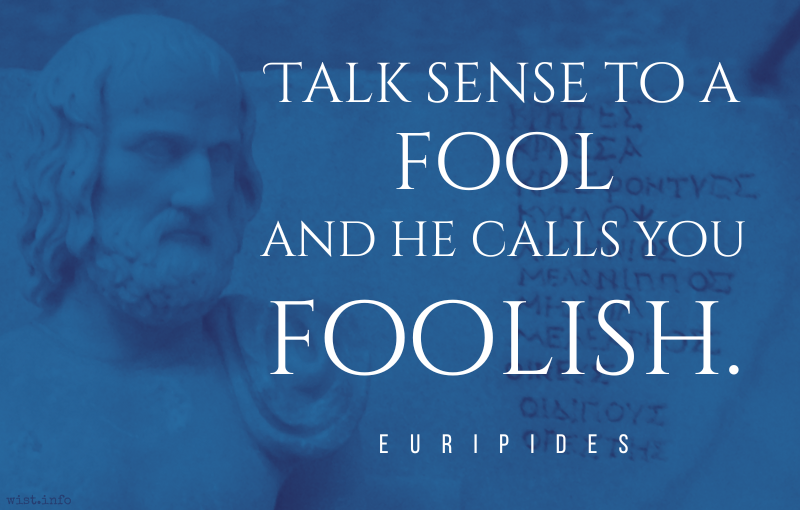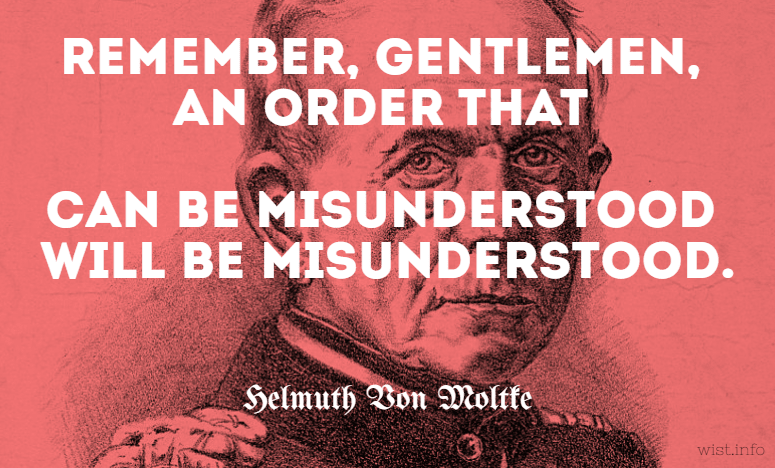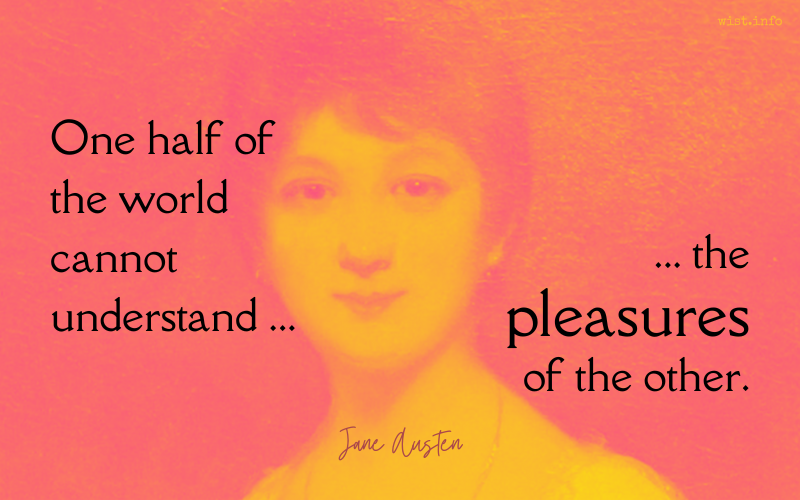The natural approach to human relations presumes that to know any person well enough is to love him, and that, therefore, the only human problem is a communication problem. It refuses to admit the possibility that people might be separated by basic, deeply held, genuinely irreconcilable differences — philosophical, political, or religious. Thus, the effort to trivialize etiquette as being a barrier to the happy mingling of souls, actually trivializes intellectual, emotional, and spiritual convictions by characterizing any difference between one person’s and another’s as no more than a simple misunderstanding, easily solved by frank exchanges or orchestrated “encounters.”
Judith Martin (b. 1938) American author, journalist, etiquette expert [a.k.a. Miss Manners]
Common Courtesy, “In the Quest for Equality, Civilization Itself Is Maligned” (1985)
(Source)
Originally published in The New Republic in 1984.
Quotations about:
misunderstanding
Note not all quotations have been tagged, so Search may find additional quotes on this topic.
They’re talking about things of which they don’t have the slightest understanding, anyway. It’s only because of their stupidity that they’re able to be so sure of themselves.
Franz Kafka (1883-1924) Czech-Austrian Jewish writer
The Trial, ch. 1 (1925) [tr. Wyllie (2003)]
(Source)
The protagonist Josef K., musing over the minor functionaries who have arrested him on unknown charges.
It’s through universal Misunderstanding that everybody comes to agreement.
If, by some misfortune, everybody understood each other, one could never come to agree.
[C’est par le malentendu universel que tout le monde s’accorde.
Car si, par malheur, on se comprenait, on ne pourrait jamais s’accorder.]Charles Baudelaire (1821-1867) French poet, essayist, art critic
Journaux Intimes [Intimate Journals], “Mon cœur mis à nu [My Heart Laid Bare],” § 99 (1864–1867; pub. 1887) [tr. Sieburth (2022)]
(Source)
(Source (French)). Alternate translations:
It is by universal misunderstanding that all agree.
For if, by ill luck, people understood each other, they would never agree.
[tr. Isherwood (1930)]
It is by universal misunderstanding that we agree with each other.
If, by some misfortune, we understood each other, we would never agree.
[Source]
Talk sense to a fool
and he calls you foolish.[δόξει τις ἀμαθεῖ σοφὰ λέγων οὐκ εὖ φρονεῖν.]
Euripides (485?-406? BC) Greek tragic dramatist
Bacchæ [Βάκχαι], l. 480 [Dionysus/Διόνυσος] (405 BC) [tr. Arrowsmith (1960)]
(Source)
Replying to Pentheus' charge that he's being foolishly evasive.
(Source (Greek)). Alternate translations:
He must seem devoid
Of reason, who mysterious truths unfolds
To those who lack discretion.
tr. Wodhull (1809)]
One will seem to be foolish if he speaks wisely to an ignorant man.
[tr. Buckley (1850)]
Who wiseliest speaks, to the fool speaks foolishness.
[tr. Milman (1865)]
Boors think a wise man’s words devoid of sense.
[tr. Rogers (1872), l. 457]
He were a fool, methinks, who would utter wisdom to a fool.
[tr. Coleridge (1891)]
Wise answers seem but folly to a fool.
[tr. Way (1898)]
Wise words being brought
To blinded eyes will seem as things of nought.
[tr. Murray (1902)]
He who talks wisdom to an ignorant man will seem out of his senses.
[tr. Kirk (1970)]
A wise speech sleeps in a foolish ear.
[tr. Vellacott (1973)]
Talk truth to a deaf man and he
Begs your pardon.
[tr. Soyinka (1973)]
Wise speech seems thoughtless to the ignorant.
[tr. Neuburg (1988)]
What makes no sense is talking sense to a fool.
[tr. Cacoyannis (1982)]
To the ignorant, wisdom will seem folly.
[tr. Blessington (1993)]
To the ignorant man, any speaker of wisdom will seem foolish.
[tr. Esposito (1998)]
Speak wisdom to a fool and he'll think you have no sense at all.
[tr. Woodruff (1999)]
Wise things to the ignorant will sound like nonsense.
[tr. Gibbons/Segal (2000)]
Speak wisdom to a fool and he will think you foolish.
[tr. Kovacs (2002)]
Wise words spoken in the ear of a fool turn into nothingness.
[tr. Rao/Wolf (2004)]
It is not wise for someone to say anything wise to the ignorant.
[tr. Theodoridis (2005)]
Wise words will appear foolishness -- to an idiot.
[tr. Valerie (2005)]
Yes, but, then,
a man can seem really ignorant
when speaking to a fool.
[tr. Johnston (2008)]
Sense is nonsense to a fool.
[tr. Robertson (2014)]
Wisdom always sounds silly to the unwise.
[tr. Pauly (2019)]
Only a fool takes a warning for an insult.
[tr. Behr/Foster (2019)]
One will seem to be foolish if he speaks wise things [sopha] to a senseless man.
[tr. Buckley/Sens/Nagy (2020)]
No one would talk much in society, if he only knew how often he misunderstands others.
[Niemand würde viel in Gesellschaften sprechen, wenn er sich bewußt wäre, wie oft er die andern mißversteht.]
Johann Wolfgang von Goethe (1749-1832) German poet, statesman, scientist
Elective Affinities [Die Wahlverwandtschaften], Part 2, ch. 4, “From Ottilie’s Journal [Aus Ottiliens Tagebuche]” (1809) [Niles ed. (1872)]
(Source)
(Source (German)). Alternate translation:
We would not say very much in company if we realized how often we misunderstand what others say.
[tr. Hollingdale (1971)]
Precision of communication is important, more important than ever, in our era of hair-trigger balances, when a false, or misunderstood word may create as much disaster as a sudden thoughtless act.
To be misunderstood even by those whom one loves is the cross and bitterness of life.
Henri-Frédéric Amiel (1821-1881) Swiss philosopher, poet, critic
Journal Intime (1849-05-27) [tr. Ward (1885)]
(Source)
Many of our disappointments and much of our unhappiness arise from our forming false notions of things and persons. We strangely impose upon ourselves; we create a fairyland of happiness. Fancy is fruitful and promises fair, but, like the dog in the fable, we catch at a shadow, and when we find the disappointment, we are vexed, not with ourselves, who are really the imposters, but with the poor, innocent thing or person of whom we have formed such strange ideas.
Abigail Adams (1744-1818) American correspondent, First Lady (1797-1801)
Letter to Hannah Lincoln (5 Oct 1761)
(Source)
The secret language of statistics, so appealing in a fact-minded culture, is employed to sensationalize, inflate, confuse, and oversimplify. Statistical methods and statistical terms are necessary in reporting the mass data of social and economic trends, business conditions, “opinion” polls, the census. But without writers who use the words with honesty and understanding and readers who know what they mean, the result can only be semantic nonsense.
If you want that good feeling that comes from doing things for other folks then you have to pay for it in abuse and misunderstanding.
Zora Neale Hurston (1891-1960) American writer, folklorist, anthropologist
Moses, Man of the Mountain [Moses] (1939)
(Source)
What is madness? To have erroneous perceptions and to reason correctly from them.
Voltaire (1694-1778) French writer [pseud. of Francois-Marie Arouet]
Philosophical Dictionary, “Madness” (1764)
(Source)
I have come to believe over and over again that what is most important to me must be spoken, made verbal and shared, even at the risk of having it bruised or misunderstood.
Audre Lorde (1934-1992) American writer, feminist, civil rights activist
“The Transformation of Silence into Language and Action,” speech, Modern Language Association (28 Dec 1977)
(Source)
Don’t write so you can be understood. Write so that you cannot be misunderstood.
Quintilian (39-90) Roman orator [Marcus Fabius Quintilianus]
De Institutione Oratoria, Book 8, ch. 2, l. 24
Alt. trans.: "We should not write so that it is possible for [the reader] to understand us, but so that it is impossible for him to misunderstand us."
Also attributed to Epictetus, Francis Bacon, Robert Louis Stevenson, Ralph Waldo Emerson, and William Taft.
A Little Learning misleadeth, and a great deal often stupifieth the Understanding.
George Savile, Marquis of Halifax (1633-1695) English politician and essayist
“False Learning,” Political, Moral, and Miscellaneous Thoughts and Reflections (1750)
(Source)
We should be careful to get out of an experience only the wisdom that is in it — and stop there; lest we be like the cat that sits down on a hot stove-lid. She will never sit down on a hot stove-lid again — and that is well; but also she will never sit down on a cold one anymore.
But they think they know it. And their idea is all the same. You can trace it to the same thing, doesn’t make any difference what it is, what their experience is, or why they’re mad with the Court. It’s all because each one of them believes that the Constitution prohibits that which they think should be prohibited, and it permits that which they think should be permitted.
Hugo Black (1886-1971) American politician and jurist, US Supreme Court Justice (1937-71)
Interview with Eric Serverid and Martin Agronsky, CBS News (1968-12-09)
On the public's misunderstanding of the Constitution. Reprinted in "Newsmakers, Objection Overruled," Newsweek (1968-12-09), and in "Justice Black and the Bill of Rights," Southwestern University Law Review (1977).
Black used the same idea on multiple occasions, e.g., at a news conference in Washington, D.C. (1971-02-25):
The layman's Constitutional view is that what he likes is constitutional and that which he doesn't like is unconstitutional. That about measures up the Constitutional acumen of the average person.
One half of the world cannot understand the pleasures of the other.
In a theatre it happened that a fire started off stage. The clown came out to tell the audience. They thought it was a joke and applauded. He told them again, and they became still more hilarious. This is the way, I suppose, that the world will be destroyed — amid the universal hilarity of wits and wags who think it is all a joke.
Søren Kierkegaard (1813-1855) Danish philosopher, theologian
Either/Or, “Diapsalmata” (1843)
Alternate translation: "It happened that a fire broke out backstage in a theater. The clown came out to inform the public. They thought it was a jest and applauded. He repeated his warning. They shouted even louder. So I think the world will come to an end amid the general applause from all the wits who believe that it is a joke."
Alternate translation: "A fire broke out backstage in a theatre. The clown came out to warn the public; they thought it was a joke and applauded. He repeated it; the acclaim was even greater. I think that's just how the world will come to an end: to the general applause of wits who believe it's a joke"
“Rabbit’s clever,” said Pooh.
“Yes,” said Piglet. “Rabbit’s clever.”
“And he has a Brain.”
“Yes,” said Piglet, “Rabbit has a Brain.”
There was a long silence.
“I suppose,” said Pooh, “that’s why he never understands anything.”A. A. Milne (1882-1956) English poet and playwright [Alan Alexander Milne]
House at Pooh Corner, ch. 8 “Piglet Does a Very Grand Thing” (1928)
(Source)



























